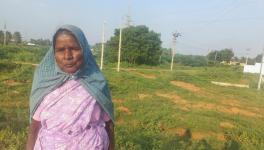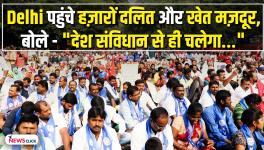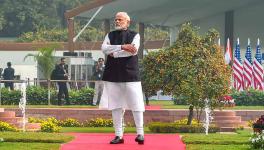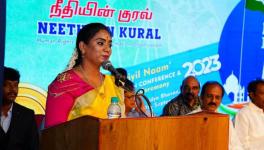2 Dalit Children ‘Lynched’ for Open Defecation, Govt Claims Rural India Is ODF
Image for representational use only.Image Courtesy : Prabhat Khabar
While the Centre is gearing up to declare the country ‘open defecation free (ODF)’ under the Swachh Bharat Mission (SBM) on October 2 this year, two Dalit children in Shivpuri district of Madhya Pradesh, who reportedly had no toilet facility at home, were allegedly beaten to death by two upper caste men for defecating on road.
The victims Roshani Balmiki (12) and Avinash Balmiki (10) were residents of Bhavkedhi, a village in Shivpuri district, which was declared “open defecation-free” on April 4 last year. While labourer Manoj Balmiki, elder brother of Roshani and father of Avinash, said that they were facing discrimination over their caste in Bhavkedhi village. The family of deceased also said that the panchayat had sanctioned a house with a toilet for them, but the sarpanch, a relative of the accused, had “scuttled the proposal”.
“We haven’t got a toilet at home. The children went out to defecate in the morning,” said Manoj while talking to reporters.
“Rameshwar and Hakam, who were standing near their hand pump, shouted at them for defecating on the road and rained blows with sticks on the children’s heads while they were relieving themselves, killing them in seconds.”
Read More: Failure of Ujjwala and Swachh Bharat Mission in Modi's Own Constituency
The two accused, Hakim Yadav and his brother Rameshwar Yadav, have been arrested and booked under IPC sections for murder and provisions of the Scheduled Castes and Scheduled Tribes (Prevention of Atrocities) Act, said RS Dhakad, inspector at the Sirsod police station, while speaking to PTI.
The investigation so far suggests that there are only two accused, he said.
The accused attacked the children when the latter were defecating on a street in front of the panchayat building at around 6.30 am, the police said, quoting from the complaint filed by the parents of the deceased. The two children suffered serious injuries and were rushed to the district hospital where doctors declared them dead, the police said.
A police source said that Hakam had declared that he had killed the children as God had commanded him in his dream to kill “demons”.
Centre’s claims and realities of SBM
The Madhya Pradesh incident has taken place a day after the government website claimed that rural India is open defecation free. Soon after Prime Minister Modi announced at a Houston event that the country had got rid of this infamous practice, the entire map of rural India on the government website turned green indicating the end of open defecation.
As per the Ministry of Jal Shakti, Department of Drinking Water and Sanitation, as many as 5,99,996 villages have become ODF. Before Modi’s announcement in Houston, the status of toilet coverage in rural India was 99.9 percent.
Read More: Swachh Bharat Mission Flouts Human Rights Principles says UN, Indian Government Denies the Claim
On the other hand, prime minister Modi is all set to declare the country ODF on the occasion of 150th birth anniversary of M K Gandhi on October 2. Modi’s declaration would be in the presence of over 20,000 village heads at a function at the Sabarmati Riverfront in Ahmedabad.
While, as per the data from the second edition of National Annual Rural Sanitary Survey (NARSS) 2018-19, 93.1% of rural Indian households have access to toilets and 96.5% of these toilets are in constant usage. Though the survey outputs were promising compared to 2017-18 data, which said 77% of population had access to toilet facilities, the reports from various parts of the country and other studies present a different narrative.
A study released in January 2019 by Research Institute for Compassionate Economics (RICE) and accountability initiative of the Centre for Policy Research said that despite toilets in place, a quarter of rural population stuck to open defecation.
“We covered 1,558 households in 157 villages in Madhya Pradesh, Bihar, Uttar Pradesh and Rajasthan and tracked changes between 2014 and 2018. It was found that while there was a huge increase in toilet ownership, it did not translate into a proportionate increase in usage,” said Nazar Khalid, research fellow, RICE.
The 13th Annual Status of Education Report (ASER) released in January 2019 depicted that 22.8% rural schools surveyed have unusable toilets.
“In our studies, we found that in ODF panchayats, out of 82% constructed toilets, 70% toilets are functional and only 49% are regularly used by the beneficiary,” said Avani Kapur, director, Accountability Initiative.
A Parliamentary Committee report which was submitted in Lok Sabha on July 19, 2018, had observed that Gandhi’s dream of “total sanitation for all and a clean India is still elusive”.
The Parliamentary Committee on Rural Development (2017-18), headed by Dr. P Venugopal of AIADMK, dismissed in the report the claim by the Ministry of Drinking Water and Sanitation (MDWS) that about 84 per cent of the rural areas of the country had sanitation coverage as of May 24, 2018. The report read: “The committee while examining the subject was of the view that the sanitation coverage figures seemed to be more on ‘Paper’, but the actual progress at the ground level is very lethargic.”
“Even a village with 100% household toilets cannot be declared ODF till all the inhabitants start using them. The main thrust of the government should be on the usage of toilets, as mere building of toilets alone is not sufficient for the realisation of actual vision of an ODF country,” said the report.
Though there are structures that are being built under the Swachh Bharat Mission (SBM), availability of water is a crucial issue. An analysis by the Centre for Science and Environment (CSE) and Down To Earth says that in the water-scarce districts, the “toilets are used only during monsoon and post-monsoon period when there is availability of water”.
Get the latest reports & analysis with people's perspective on Protests, movements & deep analytical videos, discussions of the current affairs in your Telegram app. Subscribe to NewsClick's Telegram channel & get Real-Time updates on stories, as they get published on our website.
























